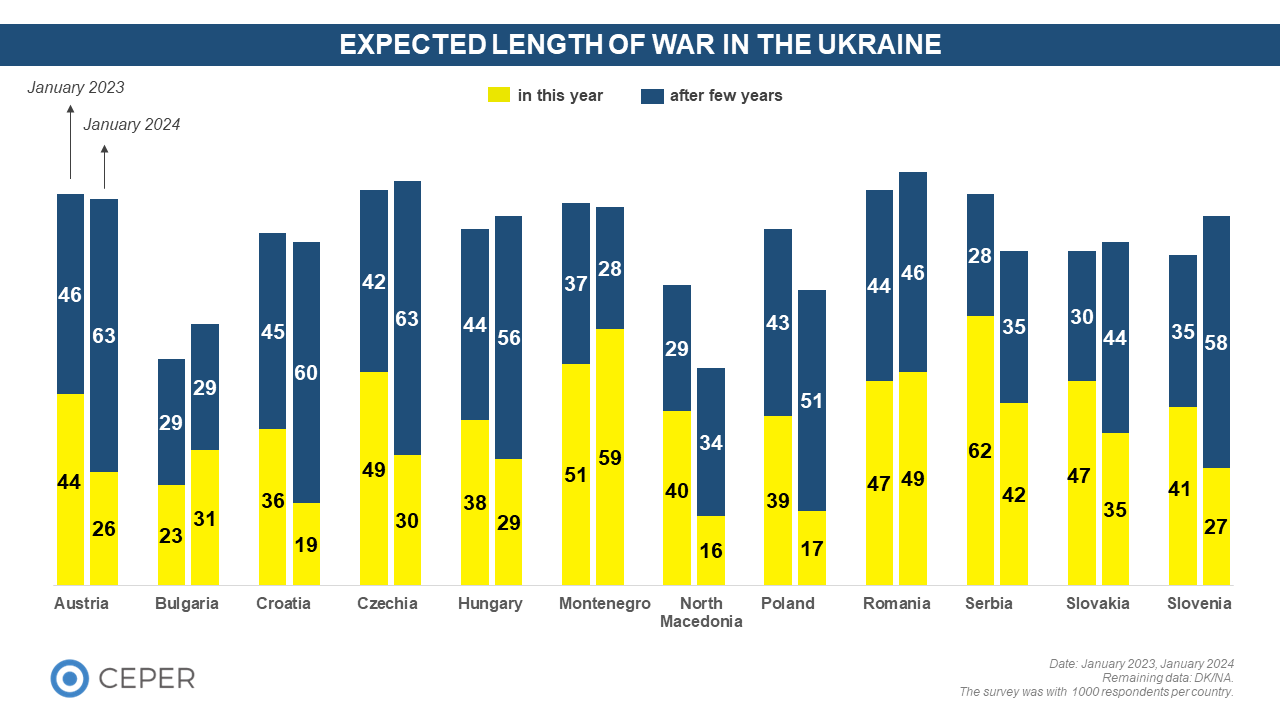Bracing for a Long War: In Six Central European Countries the Absolute Majority Prepares for a Prolonged War
In 9 out of 12 Central European countries more respondents brace for a long war today than a year ago. While in January 2023 in neither of the studied countries did more than 46% of respondents believe that the conflict will last for the years to come, ahead of the second anniversary of Russia’s invasion of Ukraine, in January 2024 in half of the studied countries between 51 to 63% of respondents expect the war to drag on for years.
24 February 2024 marks the second anniversary of the invasion of Ukraine. Two years after the beginning of the conflict some of Ukraine’s Western neighbours as well as some other Central European countries were polled about their expectations with regards to the end of the Russan-Ukrainian war. The question respondents were asked was identical to the one surveyed a year earlier, allowing for the assessment of the change in the region’s expectations. Overall, in the past twelve months in Austria, Croatia, Czechia, North Macedonia, Poland, Serbia, Slovakia, Slovenia and Hungary too, the number of respondents who believed that the war would carry on in the next couple of years significantly increased.
Differently from most regional countries, in 2024 in Romania, Montenegro and Bulgaria the percentage of respondents who expected the war to finish by the end of this year did not decrease compared to the survey done a year ago. In 2023 in Montenegro 51%, in Romania 47% while in Bulgaria 23% of respondents believed that the conflict will be soon over. That is, the sentiment in these countries did not change – similarly to 2023, early this year 59% of Montenegrins, 49% of Romanians and 31% of Bulgarians claimed that the war will be over within the next 10 months. Thereby, these countries are the only in the region where over the course of 2023 respondents did not start to brace for a prolonged war – in these countries a similar number or even more respondents expected the war to finish by the end of 2024 than how many believed twelve months ago that the war will be over by late December 2023.

Contrary to these three, in the remaining 9 studied countries respondents are now less inclined to accept the possibility of ceasing hostilities soon than a year ago – the sentiment that the conflict will carry on for long strengthened in the region. While in 2023 Austrians were the most doubtful about the chance of suddenly ending the conflict with 46% of respondents saying that the war will last for years, in 2024 Czechs and Austrians are the least prone to agree with the possibility that the hostilities can end soon, with 63% of them expecting the war to drag on for the years to come. Twelve months ago, in neither of the studied countries did the absolute majority of respondents brace for a long war. By now, however, in Austria, Czechia and Croatia not less than 60% expects a long war. In addition to these countries, in Poland, Slovenia and Hungary too, the absolute majority of respondents expects the war to drag on in the years to come. Twelve months ago, in Hungary and Poland around 43-44% expected the conflict to last for long, now over 50% in both countries share this opinion. In Slovakia 30%, while in Slovenia 35% of respondents awaited a long war on the first anniversary of the invasion, by now, 44% and 58% of Slovaks and Slovenes believe that the war will not end in the next 10 months. Moods strengthened in favour of this position in North Macedonia too – last year 29% this year 34% of respondents expected a long war.
While last year Serbs were the most confident (62%), that hostilities will stop by late 2023, in January 2024 only 42% of Serbs believed that a ceasefire or peace will be achieved by December, and 35% of the country’s respondents claimed that the war will carry on for years. In 2023 in 8 of the surveyed countries no less than 40% of respondents believed that the conflict can be resolved within a year, this year, however, in 9 of the countries less than 36% of respondents believe that the conflict can be ended by late 2024. In short, Central Europe awaits the second anniversary of Russia’s invasion with bracing for a long war.
Methodology
The opinion-poll survey was carried out in 12 countries in the Central European region: Austria, Bulgaria, Croatia, Czech Republic, Hungary, Montenegro, North-Macedonia, Romania, Serbia, Slovakia, Slovenia and Poland. The data were collected between 09 January and 01 February 2023 and between 08 January and 07 February 2024. The survey was conducted by telephone with 1 000 respondents per country. The sample per country is representative by gender, age and type of settlement.
About us
CEPER is the brand of CEPER Group GmbH. The CEPER acronym abbreviates Central European Perspectives. CEPER's area of expertise is Central European affairs, the company offers media monitoring, market research and opinion polls from the region to its clients.